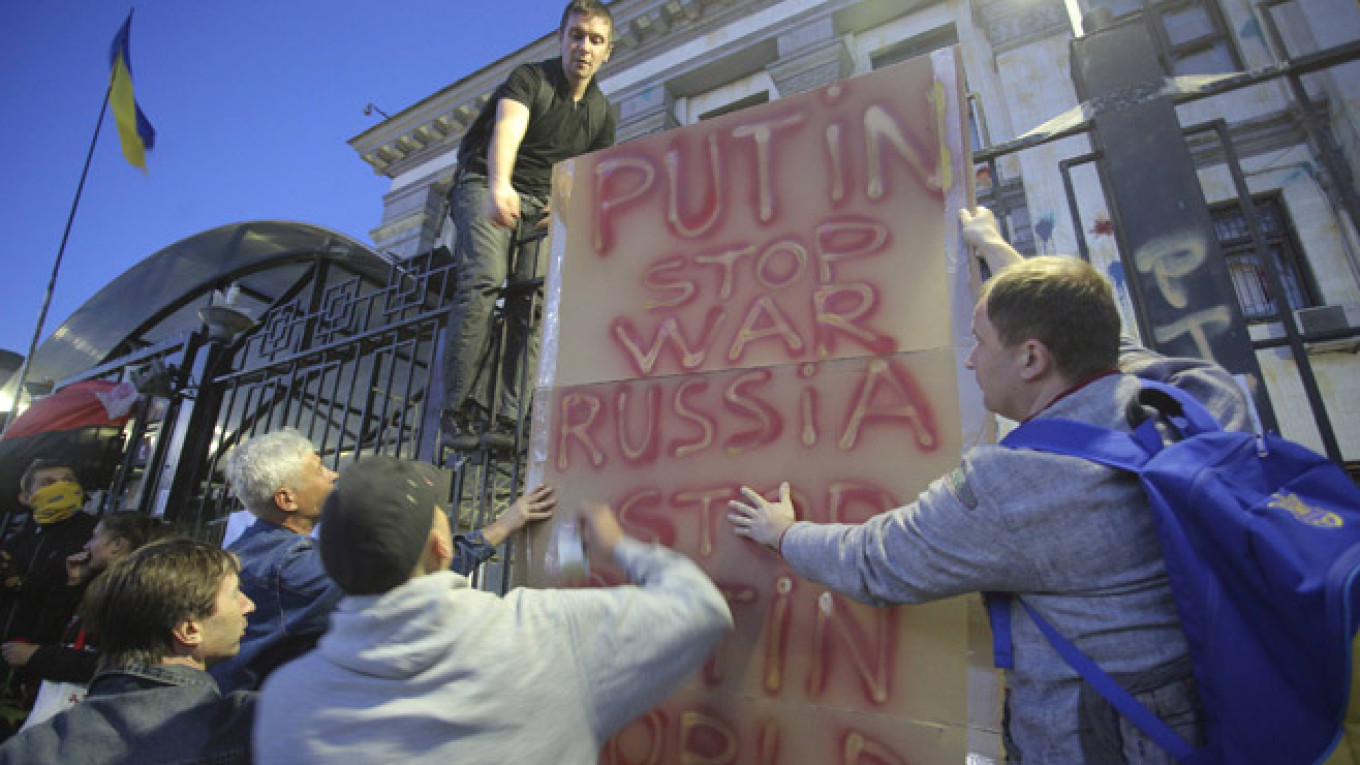It is wrong to attack a foreign embassy. Nonetheless, an agitated crowd descended on the Russian Embassy in Kiev on June 14. The night before, pro-Russian separatists in Luhansk had shot down a Ukrainian military transport plane, killing 49.
The plane was downed by Russian anti-aircraft guns, and on the very same day photographs appeared of tanks that may have crossed into Ukraine from Russia to support "concerned residents" — what Russian media euphemistically call the armed separatists. The crowd tore the Russian flag, overturned embassy cars and threw a variety of objects at the embassy, including smoke bombs. Fortunately, no diplomats were injured.
Russia reacted vigorously. Using its current seat as chairman of United Nations Security Council, Russia convened a special meeting of that body and demanded that it pass a resolution condemning the vandalism against its embassy in Kiev.
The resolution failed: some Security Council members demanded the inclusion of a phrase explaining the reason for the riots at the embassy — meaning the downing of the Ukrainian airplane. Moscow categorically rejected that proposal. Others noted that, although the events at the Embassy were regrettable, they did not warrant a special resolution from a body as authoritative as the Security Council. Russia's state-controlled media responded by accusing the Security Council members of following a double standard.
Let's talk about double standards for a moment.
The fact is that, for some reason, crowds attack foreign embassies in Moscow more frequently than anywhere else in the world, and those attacks most frequently target embassies of countries that were part of the Soviet Union prior to 1991. It seems these "concerned citizens" cannot stand to see the empire in pieces or get their heads around the fact that those former provinces are now independent states with diplomatic representation.
As recently as March of this year, young men stormed the Ukrainian Embassy in Moscow, tore the flag, threw a couple of smoke bombs and scattered leaflets reading "Kiev is a Russian city." What's more, members of the Kremlin-funded Nashi youth group have vandalized the Moscow embassies of Latvia, Lithuania and Estonia countless times, hurling ink, breaking windows and lighting fires. In fact, when Nashi activists tore the flag of the Estonian Embassy in Moscow in 2007, Vasily Yakemenko — a senior official in the administration of then-Prime Minister Vladimir Putin — made a point of publicly paying the requisite 500 ruble fine.
Putin's supporters regularly protest at foreign embassies and rarely confine themselves to purely verbal assaults skirmishes. Their preferred weapons are inkpots, tomatoes and other similar items — all of which they hurl against the embassy walls and windows. Protestors have thrown every manner of object at the U.S. Embassy in Moscow over the years, and staged their most recent "egg toss" at the same time the offending events against the Russian Embassy in Kiev were transpiring last Saturday.
And that's not all. Someone fired a grenade launcher at the U.S. Embassy in Moscow in 1995. The grenade pierced a wall and blew a photocopier to smithereens. Fortunately, nobody was in the building at the time. The authorities never found the perpetrator. Four years later, a certain Alexander Suslikov attempted to repeat that stunt, but his grenade launcher malfunctioned. After his arrest, he explained that he was protesting the use of force against Yugoslavia.
Of course, all of these actions are wrong. It is inappropriate and illegal to attack an embassy. But in Russia the rule seems to be that it is wrong for anyone to attack a Russian Embassy, but perfectly fine for Russians to attack whichever foreign embassy they please. And unfortunately, not only do various "concerned citizens" hold that view, but also the state authorities.
Andrei Malgin is a journalist, literary critic and blogger.
A Message from The Moscow Times:
Dear readers,
We are facing unprecedented challenges. Russia's Prosecutor General's Office has designated The Moscow Times as an "undesirable" organization, criminalizing our work and putting our staff at risk of prosecution. This follows our earlier unjust labeling as a "foreign agent."
These actions are direct attempts to silence independent journalism in Russia. The authorities claim our work "discredits the decisions of the Russian leadership." We see things differently: we strive to provide accurate, unbiased reporting on Russia.
We, the journalists of The Moscow Times, refuse to be silenced. But to continue our work, we need your help.
Your support, no matter how small, makes a world of difference. If you can, please support us monthly starting from just $2. It's quick to set up, and every contribution makes a significant impact.
By supporting The Moscow Times, you're defending open, independent journalism in the face of repression. Thank you for standing with us.
Remind me later.


